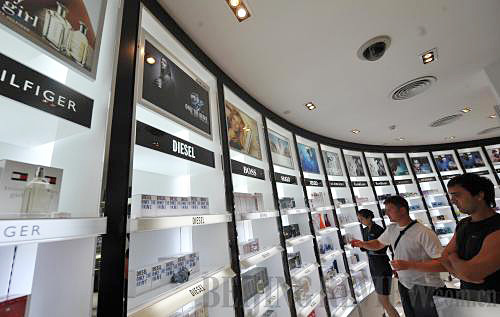|
 |
|
IN A BUYING MOOD: Foreign customers pick up goods at the Sanya Duty-free Shop, which opened on September 1, 2010 (GUO CHENG) |
For tourists looking for a breath of fresh air, the tropical island of Hainan—with its year-round sunshine and palm tree-lined beaches—offers vacationers the best opportunity to experience paradise. Now the island's appeal is increasing for a different reason: duty-free shopping.
On December 27, 2010, the Ministry of Finance announced a pilot program allowing overseas tourists to claim tax refunds for 11 percent of their purchases in designated shops when leaving the island.
The program, effective January 1 this year, applies to travelers from foreign countries and Taiwan, Hong Kong and Macao, who buy goods worth more than 800 yuan ($120) in one day at a single department store in Hainan. It covers 324 items in 21 categories such as clothing, cosmetics, watches, jewelry, electronics, stationery, sporting goods and furniture.
On the first day of this year, the province designated the first three pilot shops, including the Hainan Shengsheng Department Store at Haikou, the provincial capital.
"We will pick more reliable and well-managed shopping malls as pilot shops and smooth the way for further implementation of the program," said Lu Yong, Deputy Director of Hainan Provincial Department of Finance.
Preparation work began more than a month ago, and now the province is fully ready for the program, said Shi Fangxiao, Deputy Director of Sanya Customs. "We want to guarantee that travelers enjoy more efficient services and go through the entire refunding procedure in just two minutes."
New revenue
The program is part of the country's vigorous efforts to turn Hainan, once an agricultural island, into an international tourism destination, in hopes of luring overseas visitors and bringing in extra income to its vast and underdeveloped countryside.
The goal is for tourism to account for more than 8 percent of Hainan's GDP by 2015 and more than 12 percent by 2020.
In recent years, waves of tourists have washed upon the sandy beaches of Hainan, breathing new life into the once-sluggish economy. In the first 11 months of 2010, Hainan's tourism industry generated revenues of nearly 23 billion yuan ($3.5 billion), soaring 20.7 percent from the previous year.
However, despite attractive facilities and scenery, the beauty of Hainan has yet to spark global interest. The island played host to more than 23 million overnight visitors from January to November 2010, only 2.6 percent of whom came from overseas.
"The tax incentive is expected to add to the island's charisma," said Wang Keqiang, Deputy Director of the Hainan Provincial Department of Commerce. Many of Hainan's competitive industries will become beneficiaries, including garments, pearl powder and golf equipment.
Shopping revenue from overseas tourists now accounts for barely 20 percent of the total consumption in Hainan, and the refunding program is likely to bolster the number to 40 percent, an average level of developed countries, Wang said.
"The incentive is bound to deliver a boost to a string of related industries, such as those in the logistics, manufacturing and service sectors," said Zhao Ping, a senior researcher at the Chinese Academy of International Trade and Economic Cooperation under the Ministry of Commerce. "But the rebate rate still has room to increase," he said. The rate is 16.38 percent in France and 15.97 percent in Germany.
Sun Lichan, a marketing manager at Byecity.com, an outbound travel service provider, said it is necessary for the program to cover more made-in-China products, which would be less pricey than foreign luxuries and more attractive to consumers.
The tax refund policy, first implemented by Sweden in the 1980s, has taken root in more than 50 countries and regions worldwide including the EU, Australia and Japan. As a strong perk for the tourism industry, it paved the way for many Asian economies to take off.
Hong Kong is basking in the glow of a duty-free shopping spree. But before posing a threat to Hong Kong as a shopping paradise, Hainan still has a long way to go.
No matter whether it's big brands, sport shoes, or cameras, Hong Kong has the latest and newest varieties, and yet the cheapest price, said Michael Wu, Chairman of Travel Industry Council of Hong Kong on a local radio program. "For mainlanders, due to the currency rate, buying in Hong Kong is pretty much like having a discount of 25 percent off on everything. We don't see the rebate policy of Hainan having any influence on Hong Kong."
Domestic drawback
While the tax rebate gives Hainan a chance to shine, it came as a disappointment to many—mainlanders, in particular.
"I was a little disappointed when I heard only overseas tourists could buy duty-free goods here," 23-year-old Zhang Yali from Inner Mongolia Autonomous Region, told Xinhua News Agency. "I hope the program is widened to include domestic visitors as soon as possible."
"The policy, if not expanded, would have no substantial impact since a majority of Hainan's potential customers come from the mainland," said Chen Qingqing, a senior analyst at the China Securities Co. Ltd.
On September 1, 2009, Sanya, an economic hub in south Hainan, opened the island's first duty-free shop outside the city's airport, providing a selection of top-brand cosmetics and jewelry. But the shop has been swimming in red ink because only overseas visitors were eligible for its tax rebates.
"Currently the island is just not ready for massive duty-free shopping," said Lu Yong. "But the proposal is now under discussion."
| 